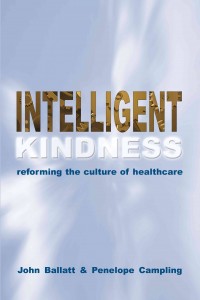
We host an interview to John Ballatt, author with Penelope Campling of the book “Intelligent Kindness, reforming the culture of Healthcare”.
John began his career in democratic therapeutic communities, before moving on to train and manage social workers, and then to work as a senior manager in the UK NHS. He was responsible for managing services and leading strategic organisational change. He now works independently to support individuals, teams and organisations in health and social care.
How did you get to rediscover the concept of kindness, which somehow reminds us of “an ancient forgotten style”?
It’s a bit complicated. Several years ago there were a number of scandals showing shocking neglect and abuse in a number of settings in the UK NHS. Penelope Campling (co-author of ‘Intelligent Kindness: reforming the culture of healthcare‘) and I were concerned about the understandable reaction. Calls to improve systems, to demand compassion from staff, to ensure cultures of compassion, seemed to us to fail to think about what such cultures entailed, what is needed to sustain compassion. In particular, there was a dangerous failure to think about the nature of, and factors influencing, clinician-patient, and clinician-clinician relationships, especially factors relating to the dynamics of human groups.
We searched for ways to think about this. The concept of ‘kinship’ took us back to the evolutionary and social roots of belonging, cooperation, altruism and compassion. In this context, ‘kindness’ is an expression of such collective belonging, a ‘feeling realization’ that ‘your wellbeing is also my wellbeing’. The Italian term ‘gentilezza’ also links kinship to kindness. Kindness has, of course, been rather denigrated over recent centuries, relegated to a private, sentimental, soft, domain – certainly not the domain of professionalism. But it offers a crucial perspective on the nature of a culture of cooperation and compassion.
Kinship is also a useful thing to think about because it can also go very wrong. Within kinship groups, and between such groups, conflict, rejection, abuse and discrimination can emerge all too readily. Considering the dynamics of kinship can help us go beyond a simple demand for compassion or kindness, to understand the factors that nurture or undermine it. A range of personal, group and contextual factors influence the nature of relationships between people, within the ‘family’ or reaching out inclusively to ‘the other’. These factors can be thought about and addressed in attempting to create and sustain the organisational culture that will deliver effective and compassionate care.
 What is the main difference between Intelligent kindness and a ‘normal kindness’?
What is the main difference between Intelligent kindness and a ‘normal kindness’?
Simple kindness is not enough. We must resist the temptation to move someone with broken bones to a more comfortable place. Soldiers liberating concentration camps after the Holocaust kindly shared their rations with starving prisoners – whose ability to digest was so damaged that many died. The concept of intelligent kindness suggests that all healthcare is relational, but stresses the need to exercise both ‘technical/professional’ and ‘emotional/social’ intelligence in the caring relationship. Intelligent Kindness also involves an understanding of the psychological and emotional factors in the individual, the group and the wider system that require attention to ensure effective, compassionate care.
The patient and the clinical team have to manage the anxiety, pain, disgust that are so often part of experiencing and treating illness and ill-being. They have to be able do this as individuals and as teams and groups. We believe that expecting the individual to manage herself so as to be effective and compassionate is not enough. Though practicing mindfulness or meditation might help that individual, it is through addressing the conditions and dynamics of the wider system that a culture of intelligent kindness can grow. Such a culture sustains its members in working together compassionately, efficiently and effectively. We like your idea of ecological healthcare. I think we both recognise that it is in a system, a culture, that good practice emerges, nourished by the right awareness, values, behaviour and conditions. This is as true of an orchestra or a football team as it is of a healthcare team. All are relational systems, which can be helped to strengthen mutual attentiveness, attunement, trust and effective collaboration. Intelligent kindness is not a commodity or a tool. It is a way of thinking about, developing and participating effectively in a culture that has its roots in our evolutionary history of collaboration and solidarity – our positive kinship.
Why is kindness so difficult to achieve in the setting of care, paradoxically, since fragile patients are those that need it most?
However skilled and professional the clinicians, they and the patient have to manage the profound anxiety involved in meeting illness and ill-being. They have to resist the temptation to turn away, to deny, to panic. This is as much, if not more, unconscious as conscious, in both patient and clinician. Ignoring, or managing this anxiety badly can blind us, distort and cut the human connections between clinicians – with each other and with patients. Anxiety can generate competition, hostility, and exclusion. It can cloud the mental space necessary to stay attentive, to be moved, to manage emotions, relationships and clinical skills properly. Anxiety is a factor for individuals, teams and wider systems.
One effect of pervasive anxiety is that organizations can become perverse, as Susan Long notes in her work. In such organizations people, especially leaders, use others as means to ends, as instruments to satisfy their own needs, or reduce their anxiety. As in individual perversion, in such manipulative and demanding cultures, there is a turning of a blind eye, a both willful and unconscious denial of the cost to the other, of the problems they encounter in meeting the demands, of what is involved in doing their work well. Inevitably, care suffers in healthcare organizations that behave like this.
What are the causes of this pervasive anxiety in healthcare?
Well, I’ve mentioned the nature of illness and ill-being. But there is a range of other factors. Many of them are to some degree unavoidable in the modern healthcare organization, but all, if not managed intelligently, can have dangerous side-effects that undermine effective, compassionate care.
The sheer scale of need and the complex range of skills and resources in healthcare means that some degree of industrialization, of systematization, is inevitable. Working to meet outcome or performance targets, to be efficient, is also unavoidable to some extent. There can also be competition between organizations. At their worst, how these factors are managed can provoke enormous anxiety and distort the human system of healthcare. Leaders may be anxious that their services meet difficult targets, manage limited resources, deliver efficiency, survive. Staff can be drawn in to this anxiety, distracted from the patient and each other, looking over their shoulders to provide data, numbers, measurable outcomes, to try to manage their leaders’ anxiety, to deliver for them, to meet their needs.
There is always the danger that staff become parts of a machine, delivering fragmented procedures by rote, prevented from thinking and using their imaginations, missing the complexity of the patient. There is no doubt, for example, that check-lists can be very helpful in ensuring important basics are done, but their true value is to release space for the attentiveness, creative thinking, feeling and collaboration of the clinical team. Often the procedure or checklist is used instead of such intelligent practice.
The patients themselves can become products of production-line processes, experiencing a fragmented and impersonal journey, measured in numbers and as recipients of assorted commodities. When their needs make meeting targets difficult they may even become inconveniences! Caught between management and patients, healthcare professionals can become anxious, enraged or grimly despairing – or all these things.
Intelligent Kindness requires us to consider minimizing all these factors, and, where they are still necessary, managing them with sensitivity to their potential damage to the thinking, feeling and relationships involved in healthcare. Leaders, especially, but all staff, need help to recognise and manage anxiety and to think about whether it is being healthily contained and how it is influencing culture and practice for the organisation and its members.
Do you think that kindness is a practice can be learnt? Do you think that could reform the healthcare system?
Just as our experience of early relationships can nourish or damage our ability to develop, relate to others, to concentrate, to think, so kindness of the sort we are talking about it can be nourished and it can emerge from the quality of our experience of the people and culture in which we work. If that eco-system is properly managed, with the right understanding of what the collaborative task is, then that can promote intelligent kindness. This can be very simple. If you work with others who can bear in mind the pain of illness and death, who can discuss and respond to each other’s vulnerability to stress, tiredness, and anxiety, then you are likely to develop practice that is based in intelligent kindness.
But, in a time of technical knowledge and skills, it is vital we recognise and teach that their true effectiveness depends on these skills being delivered within a healthy and creative working relationship – with colleague and patient. Attention driven by the kindness that emerges from a sense of kinship (from being ‘of a kind’ and ‘in it together’) promotes attunement, trust, a therapeutic alliance and better clinical outcomes. We need to unite the technical and the relational in our teaching, training and language of professional healthcare.
Continuous education and professional reflection is vital. Exposing clinicians (and managers) to authentic narratives, – about patients and about staff experience – can promote kindness, empathy and relational skill. It is most powerful when such stories are delivered face to face, though stories on the page can help.
A range of reflective practice approaches, for individuals, teams and organisations, can help. It is concerning that such practice is now squeezed out, almost as a luxury. We also need to recognise that supervisors and mentors of clinical staff need, themselves, support to understand and value the psychological, emotional and the relational aspects of professional work.
What do you do when you have to teach evidence-based doctors. When can EBM be defined more as an ideology that a science?
There can be an almost Aspergers-like failure or resistance to integrating the psychological, the relational, with the technical, the procedural. I think we need to confront this head-on. Evidence is important. But as scientists, people who cling rigidly to a narrow, ‘hard-evidence’, technical perspective need to recognise that evidence, like all scientific knowledge, is proved wrong or replaced, changes or develops, over time. Good scientists are always attentive to anomaly, contradictory evidence, special circumstances – and that requires psychological openness. Secondly, I would also refer to the evidence that supports the benefit, in terms of effectiveness outcomes of care and efficiency, of attending to the quality of the relationship between clinician/services and patients. I would point out the enormous range of research about how human beings, groups and wider social systems survive, thrive, cooperate and succeed (or not).
There must be a firm assertion of the integrated technical and relational nature of health care practice at all levels. This goes further than semi-optional ‘communication skills’ training to a clear expectation that all practitioners need to recognise the equally important responsibility to manage themselves, and their relationships, alongside any technical learning.
In the end, though, there is a strong argument for leaders, especially, but all staff in reality, concentrating on caring for the caregivers, by addressing the conditions in which they work, recognizing their experience and openly valuing work to realize intelligent kindness. Just as in any eco-system, attentive work on such conditions leads to the emergence of healthy developments.
